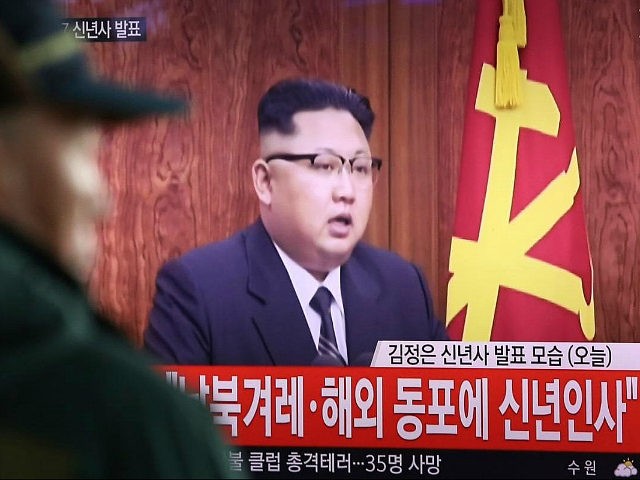American media outlets circulated news reports Wednesday afternoon alleging that North Korea had “released” the three U.S. prisoners it is known to have placed in labor camps as punishment for crimes against the nation’s communist ideology.
All appear to link back to a report from one activist, citing “a resident in Pyongyang,” who says that the three Korean-Americans were relocated from a labor camp to a Pyongyang hotel for “ideological education.” There is no indication that the Americans could choose to decline being educated in North Korea’s cult-like Juche ideology, which demands the worship of Kim Jong-un and his family – calling into question whether it is accurate to refer to them as “freed.”
Several Western media outlets alleged that the men had been released. “North Korea Allegedly Released U.S. Prisoners Ahead of Landmark Meeting with Trump,” reported Newsweek. A headline on Business Insider read, “North Korea Reportedly Hands Trump Another Big Win by Releasing U.S. Prisoners.” “North Korea Releases U.S. Detainees, Bows to Another Trump Demand,” the Washington Times printed. The Washington, DC, based site Axios reported similarly:
While the Trump administration has made bringing home Americans unjustly imprisoned abroad a hallmark of its policy, and many argue Kim Jong-un has much to gain from ceding to this demand, reports at press time do not confirm that the three prisoners are released – nor do they guarantee that they ultimately will be.
The information cited in these reports comes from Choi Sung-ryong, an advocate who represents the group Family Assembly of those Abducted to North Korea, who has taken interest in these cases as the three U.S. citizens known to be detained in North Korea are Korean-Americans. Choi told the Agence-France Presse (AFP) that a contact within North Korea told him that the prisoners “are staying in a hotel on the outskirts of Pyongyang.” Previously held in labor camps for ideological crimes, Choi says the three are “going on tours, receiving medical treatment and eating good food.”
The Financial Times, also citing Choi’s remarks, says that to them he added that Kim Dong-cheol, Kim Sang-deok, and Kim Hak-seong were also undergoing “ideological education.”
“Today I spoke to a source in North Korea by phone,” Choi said, according to a third source, UPI. “North Korea’s superior office in early April ordered the release of Kim Dong Chul, Kim Sang Duk, and Kim Hak-song, and since then they have been convalescing at a hotel outside Pyongyang, where they are also being educated.”
The Financial Times quotes Choi as stating, “We believe that Mr Trump can take them back on the day of the US-North Korea summit or he can send an envoy to take them back to the US before the summit.”
North Korea’s state ideology is called juche (roughly, “self-reliance”), a combination of Marxism-Leninism and worship of Kim Il-sung, founder of North Korea and “eternal president,” and his progeny. In addition to torture and strenuous physical activity forced on prisoners at labor camps, those imprisoned for hostile acts against the juche philosophy undergo ideological “education” to erase their counterrevolutionary feelings.
Kenneth Bae, a Christian missionary who remains the longest-serving American political prisoner in North Korean history, recalled “ideological education” during his time under arrest in the country in his book, Not Forgotten:
Every day one of the four guards assigned to me came into my room at five o’clock and told me to turn on the [TV] set. … I had no choice but to obey. On the days I turned the set off early, a guard immediately came in and ordered me to turn it back on.
…
Every day for a week they might show the same documentary of Kim Il-sung’s rise to power. By the third or fourth repeat, I prayed for a power outage.
Bae writes that he survived the weeks of propaganda by singing the songs to the Kim family but replacing their names with “Jesus.”
Choi did not provide any information as to how the American prisoners, reportedly now in Pyongyang, were being “educated,” but North Korean defector and former prisoner testimonies suggest that North Korea has a standardized system of such propaganda. As there is little information on their status, there is also a possibility that any refusal to consume the media provided during education sessions could result in further punishment of these individuals, particularly if they disparage the North Korean government in the process. There is no guarantee that they will avoid acting in a way that enrages police while being detained in a hotel.
Like Bae, Kim Sang-duk, also known as Tony Kim, is a Christian who was working for a Christian organization in North Korea. Unlike Bae, arrested for possessing Christian materials, Kim was legally employed by the Christian-funded Pyongyang University of Science and Technology (PUST), tolerated by the North Korean government because it provides elite education to the nation’s future political leaders. Kim was arrested in April 2017 attemption to board a plane to leave the country. North Korean officials have not provided any information regarding why he was arrested.
Kim Hak-song also taught at the PUST and was arrested a month after Tony Kim. Kim Hak-song reportedly described himself as a Christian missionary, likely alarming North Korean authorities, though police did not provide a reason for his detention, either.
Businessman Kim Dong-chul was arrested two years ago, in April 2016, on charges of “espionage.” Authorities forced him into a televised confession where he claimed to be attempting to smuggle military secrets out of North Korea.
At press time, the Korean Central News Agency (KCNA), North Korea’s official state news outlet, has not mentioned the reports of a potential prisoner release.

COMMENTS
Please let us know if you're having issues with commenting.